Filter by

Out of the Woods : Facilitating Pragmatic Inquiry and Dialogue
In “Into the Woods,” Karen Evans describes an increasingly hollow public administration environment that is shaped by a misplaced quest for efficiency. She looks to the pragmatism of John Dewey as a way to remedy the situation. This article extends her analysis by linking pragmatism to reflective thought, inquiry, nonlinear dynamics, and communication theories. Finally, a few suggestions for ho…
- Edition
- Vol. 43 no. 1, January 2011.pp. 124-132
- ISBN/ISSN
- 00953997
- Collation
- -
- Series Title
- Administration & Society
- Call Number
- -

On the Problem of Adopting Pragmatism in Public Administration
Answering the question, “Should public administration adopt pragmatism?” requires some agreement on what pragmatism means and what that adoption might entail. This article argues that such agreement does not currently exist and, without it, calls by administrative theorists for adoption will not receive their intended responses.
- Edition
- Vol. 43 no. 1, January 2011.pp. 133-141
- ISBN/ISSN
- 00953997
- Collation
- -
- Series Title
- Administration & Society
- Call Number
- -
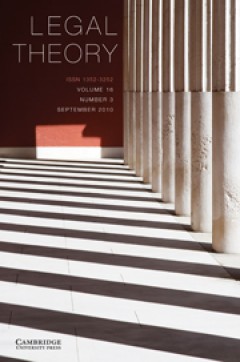
KANT'S CONCEPT OF INTERNATIONAL LAW
Modern theorists often use Immanuel Kant's work to defend the normative primacy of human rights and the necessity of institutionally autonomous forms of global governance. However, properly understood, his law of nations describes a loose and noncoercive confederation of republican states. In this way, Kant steers a course between earlier natural lawyers such as Grotius, who defended just-war t…
- Edition
- Volume 16, Number 4, December 2010.pp.229-257
- ISBN/ISSN
- 13523252
- Collation
- -
- Series Title
- Legal Theory
- Call Number
- -

How We See Them Versus How They See Themselves: A Cognitive Perspective of Fi…
The present study complements current firm—nongovernment organization (NGO) literature by emphasizing the influence of managerial cognition on organizational behavior. In particular, I find that NGOs confront or seek to collaborate with other NGOs or with firms to appear as legitimate actors before selected third parties and as a way to access various sources of funds. By contrast, firm manager…
- Edition
- Vol. 49 no. 1, March 2010.pp. 116-139
- ISBN/ISSN
- 00076503
- Collation
- -
- Series Title
- Business Society
- Call Number
- -
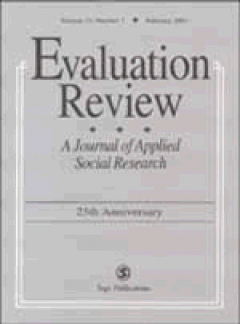
Improving Ascertainment of Risk Factors for HIV Infection: Results of a Group…
To allow appropriate allocation of prevention and care funding, HIV/AIDS surveillance data must include risk factor information, currently available for less than 70% of cases reported in the United States. The authors evaluated an intervention consisting of provider training and materials to improve risk factor reporting. Facilities were matched prior to randomization to intervention or contro…
- Edition
- Vol. 34 no. 6, December 2010.pp. 439-454
- ISBN/ISSN
- 0193841X
- Collation
- -
- Series Title
- Evaluation Review
- Call Number
- -

Examination of the Empirical Research Environment of Program Evaluation : Met…
The study dealt with a research environment in which the treatment effect is heterogeneous, and in which individuals use their assessments of the treatment effect to decide whether or not to enroll in an intervention program. In this article, a new methodology is proposed for examining the validity of the specified research environment in a given intervention program and database. The methodolo…
- Edition
- Vol. 34 no. 6, December 2010.pp. 455-486
- ISBN/ISSN
- 0193841X
- Collation
- -
- Series Title
- Evaluation Review
- Call Number
- -

A National Evaluation of Community-Based Youth Cessation Programs : Design an…
Although widely available, little is known about the effectiveness of youth cessation treatments delivered in real-world settings. The authors recruited a nonprobability sample of 41 community-based group-format programs that treated at least 15 youth per year and included evidence-based treatment components. Data collection included longitudinal surveys of youth participants (n = 878); posttre…
- Edition
- Vol. 34 no. 6, December 2010.pp. 513-548
- ISBN/ISSN
- 0193841X
- Collation
- -
- Series Title
- Evaluation Review
- Call Number
- -

Evaluating a Policing Strategy Intended to Disrupt an Illicit Street-Level Dr…
The authors examined a strategic policing initiative that was implemented in a high crime Nashville, Tennessee neighborhood by utilizing a mixed-methodological evaluation approach in order to provide (a) a descriptive process assessment of program fidelity; (b) an interrupted time-series analysis relying upon generalized linear models; (c) in-depth resident interviews. Results revealed that the…
- Edition
- Vol. 34 no. 6, December 2010.pp. 513-548
- ISBN/ISSN
- 0193841X
- Collation
- -
- Series Title
- Evaluation Review
- Call Number
- -

CONTRASTIVE CAUSATION IN THE LAW
What conception of causation is at work in the law? I argue that the law implicitly relies on a contrastive conception. In a liability case where the defendant's breach of duty must be shown to have caused the plaintiff's damages, it is not enough to consider what would have happened if the cause had not occurred—the law instructs us to look to a specific replacement for the cause, which in thi…
- Edition
- Volume 16, Number 4, December 2010.pp. 259-297
- ISBN/ISSN
- 13523252
- Collation
- -
- Series Title
- Legal Theory
- Call Number
- -
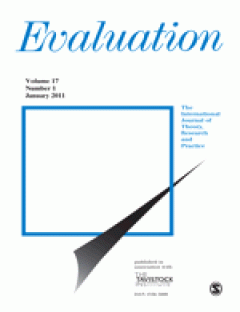
If Robert Merton said it, it must be true: A citation analysis in the field o…
This article is inspired by the current attention paid to bibliometric methods in evaluating research relevance and impact. The logic behind the trend is examined by comparing highly and less cited publications in the same knowledge field (i.e. performance measurement) to see if and how they are different, especially in terms of research design and methods used. Findings indicate that various r…
- Edition
- Vol. 17 no. 1, January 2011.pp. 7-19
- ISBN/ISSN
- 13563890
- Collation
- -
- Series Title
- Evaluation
- Call Number
- -

A realistic evaluation of fines for hospital discharges : Incorporating the h…
Programmes and policies transform over time and locations. Evaluation projects can apprehend only temporal and contextualized sections of the social world. This article uses a realist evaluation of financial incentives in English hospital discharge policy to illustrate how previous evaluations of the same programme theory were inspected for evidence to construct context, mechanisms and outcomes…
- Edition
- Vol. 17 no. 1, January 2011.pp.21-36
- ISBN/ISSN
- 13563890
- Collation
- -
- Series Title
- Evaluation
- Call Number
- -

Strengthening evaluation through interactive problem structuring: A case stud…
The quality of an evaluation largely depends on the quality of the underlying problem definition and the quality of the problem definition often improves as stakeholder involvement increases. By means of a study on the management of attempted suicides by drug overdose, we explored whether an interactive methodology could be adequate for problem structuring. Despite the fact that a high level of…
- Edition
- Vol. 17 no. 1, January 2011.pp. 37-52
- ISBN/ISSN
- 13563890
- Collation
- -
- Series Title
- Evaluation
- Call Number
- -
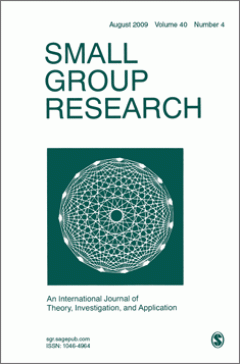
When Good Teammates Are Bad : Physiological Threat on Recently Formed Teams
This research examined the ways in which superior teammate performance in recently formed teams affects an individual’s motivation. It was hypothesized that members of recently formed teams for whom social identity was not yet salient would experience threat, a maladaptive physiological pattern that indicates low perceptions of coping resources relative to situational demands. Furthermore, it w…
- Edition
- Vol. 42 no. 1, February 2011.pp. 3-31
- ISBN/ISSN
- 10464964
- Collation
- -
- Series Title
- Small Group Research
- Call Number
- -

Two-Dimensional Structure of Team Process Improvement : Team Reflection and T…
Work group literature has recently focused on team process improvement, which refers to a learning process within the team, including the review of recent work methods and objectives and the development of alternative working strategies. Until now, however, no systematic empirical effort has been undertaken to empirically explore the dimensionality of team process improvement, although a dual f…
- Edition
- Vol. 42 no. 1, February 2011.pp.32-54
- ISBN/ISSN
- 10464964
- Collation
- -
- Series Title
- Small Group Research
- Call Number
- -

Members’ Openness to Experience and Teams’ Creative Performance
Team composition based on personality has been found to have important effects on team outcomes. However, little is still known about the effect of team personality composition on team creativity. To this end, this study examined the relationship of team members’ openness to experience and team creativity. Results from a study with 31 graduate student teams suggest that openness to experience i…
- Edition
- Vol. 42 no. 1, February 2011.pp. 55-76
- ISBN/ISSN
- 10464964
- Collation
- -
- Series Title
- Small Group Research
- Call Number
- -

Managers’ Trait Emotional Intelligence and Group Outcomes : The Case of Gro…
The purpose of this study is to extend the emerging literature on the effects of managers’ emotional skills on group outcomes. Specifically, the authors propose and test a theoretical model that examines impact of managers’ trait emotional intelligence (EI) on group job satisfaction. Data are based on middle managers and their immediate team members from public service organizations. Results, u…
- Edition
- Vol. 42 no. 1, February 2011.pp. 77-102
- ISBN/ISSN
- 10464964
- Collation
- -
- Series Title
- Small Group Research
- Call Number
- -

Considering Leadership Climate Strength : Affective Commitment Within Superma…
Using data from 5,695 employees in 345 supermarkets in Czech Republic, Poland, and Slovakia, the authors examined whether leadership climate strength (LCS), defined as the shared perceptions of employees concerning their supervisors, is related to employees’ affective commitment (AC) to the supermarket and to colleagues. In addition, the authors examined if LCS moderates the relationship betwee…
- Edition
- Vol. 42 no. 1, February 2011.pp.103-123
- ISBN/ISSN
- 10464964
- Collation
- -
- Series Title
- Small Group Research
- Call Number
- -
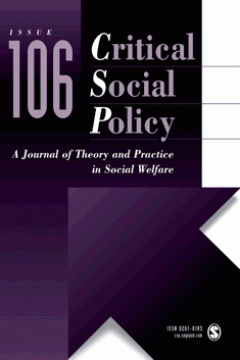
‘Conduct of conduct’ or the shaping of ‘adequate dispositions’? Labou…
In this paper, we provide an analysis of the deployment of labour market and career guidance as an instrument of liberal governmental rationality, and hence as a key tool for shaping attitudes suitable for the labour market. We characterize such processes and their effects on both those in receipt of guidance and those delivering it, on the basis of a three-year study in France, Slovenia, Spain…
- Edition
- Vol. 31 no. 1, February 2011.pp. 77-101
- ISBN/ISSN
- 02610183
- Collation
- -
- Series Title
- Critical Social Policy
- Call Number
- -

Constructing Interethnic Conflict and Cooperation : Why Some People Harmed Je…
The authors draw on a natural experiment to demonstrate that states can reconstruct conflictual interethnic relationships into cooperative relationships in relatively short periods of time. The article examines differences in how the gentile population in each of two neighboring territories in Romania treated its Jewish population during the Holocaust. These territories had been part of tsarist…
- Edition
- Volume 63, Issue 01, January 2011. pp 1 -42
- ISBN/ISSN
- 00438871
- Collation
- -
- Series Title
- World Politics
- Call Number
- -

Anti-social behaviour orders and young people with learning disabilities
This paper sets out to critically explore the use of anti-social behaviour orders (ASBOs) in relation to young people with learning disabilities. It brings together an emerging body of evidence, from a range of sources, which suggests that these marginalized and vulnerable young people are over-represented amongst those made subject to ASBOs. In this context it will provide a critique of existi…
- Edition
- Vol. 31 no. 1, February 2011.pp. 102-125
- ISBN/ISSN
- 02610183
- Collation
- -
- Series Title
- Critical Social Policy
- Call Number
- -
 Computer Science, Information & General Works
Computer Science, Information & General Works  Philosophy & Psychology
Philosophy & Psychology  Religion
Religion  Social Sciences
Social Sciences  Language
Language  Pure Science
Pure Science  Applied Sciences
Applied Sciences  Art & Recreation
Art & Recreation  Literature
Literature  History & Geography
History & Geography